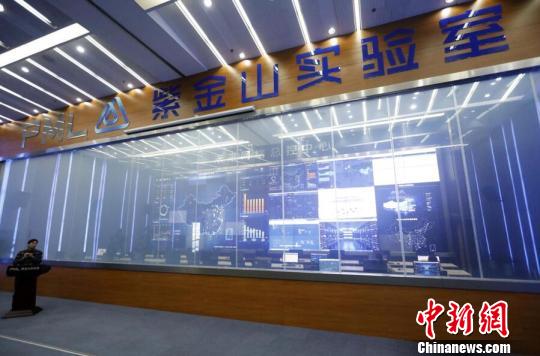

Nanjing, capital of east China’s Jiangsu province, has improved its ranking in the world from 94th in 2017 to 21st in 2020 in the Global Innovation Index released by the World Intellectual Property Organization, Nanjing Daily reported.
Such substantial progress is attributed to the city’s efforts to deepen the implementation of a new development philosophy and develop itself into a leader in innovation in recent years.

The Purple Mountain Laboratory for Network Communication and Security (Photo/Chinanews.com)
As an important science and education center in China, and the country’s only pilot city for comprehensive scientific and technological reform, Nanjing boasts rich human resources and talents for innovation.
The city is home to 53 universities and colleges (excluding military universities and colleges), and has 84 academicians of the Chinese Academy of Sciences and the Chinese Academy of Engineering.
It ranks second among Chinese cities in the numbers of college students and graduate students per 10,000 people.
In the second half of 2017, Nanjing set the goal of developing itself into an innovation-oriented city with global influence. Since then, it has established new-type research and development (R&D) institutions and fostered clusters of high-tech enterprises and innovative companies, enhanced the supply of technologies at the source and attracted high-quality resources for innovation, setting an example for innovative development of central cities.
Nanjing has established a dedicated innovation committee and over 400 new-type R&D institutions where professional managers serve as partners and talent teams hold an average of 56 percent of the shares, giving full rein to researchers.
Top international scientific research institutions, including the University of Cambridge in the U.K., Stanford University in the U.S., and the Weizmann Institute of Science in Israel, have worked closely with these R&D institutions in Nanjing.
The Nanjing-based Purple Mountain Laboratory for Network Communication and Security, a platform for breakthroughs and commercialization of research findings of national key projects and strategies concerning core technologies, has witnessed a number of major breakthroughs in key technologies including those used in network operating system CNOS (China Network Operating System) and large-scale millimeter wave phased array chips over the past two years since its launch.
The city’s Yangtze River Innovation Center for Ecological Civilization, a high-level innovative platform featuring in-depth integration of various fields including government affairs, industries, universities and research institutes, has helped Nanjing explore scientific and technological means to support the ecological protection of the Yangtze River and the high-quality development of the Yangtze River Economic Belt.
In 2020, the number of high-tech enterprises in Nanjing exceeded 7,000. The city is trying to bring the figure to over 20,000 during China’s 14th Five-Year Plan period (2021-2025), when the city is expected to realize a fundamental shift in growth drivers.
To make it easier for tech enterprises to get loans at a relatively low interest rate, Nanjing has built a multi-level and multi-dimensional system to provide financial services for them. By the end of September 2020, banks had granted loans of 23.2 billion yuan (about 3.58 billion dollars) to high-tech enterprises in the city.
Along with gathering research institutions, high-tech and innovative companies, the city has also made great efforts to attract high-caliber professionals and overseas talents on its new journey toward modernization and a global innovative city.
Over the past three years, the city has become a magnet for talents because of its endeavors to develop itself into an innovation-oriented city. It has attracted eight Nobel Prize winners and Turing Award winners and 115 domestic and foreign academicians, and seen over 1.1 million newly employed college students.
 Fire brigade in Shanghai holds group wedding
Fire brigade in Shanghai holds group wedding Tourists enjoy ice sculptures in Datan Town, north China
Tourists enjoy ice sculptures in Datan Town, north China Sunset scenery of Dayan Pagoda in Xi'an
Sunset scenery of Dayan Pagoda in Xi'an Tourists have fun at scenic spot in Nanlong Town, NW China
Tourists have fun at scenic spot in Nanlong Town, NW China Harbin attracts tourists by making best use of ice in winter
Harbin attracts tourists by making best use of ice in winter In pics: FIS Alpine Ski Women's World Cup Slalom
In pics: FIS Alpine Ski Women's World Cup Slalom Black-necked cranes rest at reservoir in Lhunzhub County, Lhasa
Black-necked cranes rest at reservoir in Lhunzhub County, Lhasa China's FAST telescope will be available to foreign scientists in April
China's FAST telescope will be available to foreign scientists in April "She power" plays indispensable role in poverty alleviation
"She power" plays indispensable role in poverty alleviation Top 10 world news events of People's Daily in 2020
Top 10 world news events of People's Daily in 2020 Top 10 China news events of People's Daily in 2020
Top 10 China news events of People's Daily in 2020 Top 10 media buzzwords of 2020
Top 10 media buzzwords of 2020 Year-ender:10 major tourism stories of 2020
Year-ender:10 major tourism stories of 2020 No interference in Venezuelan issues
No interference in Venezuelan issues
 Biz prepares for trade spat
Biz prepares for trade spat
 Broadcasting Continent
Broadcasting Continent Australia wins Chinese CEOs as US loses
Australia wins Chinese CEOs as US loses